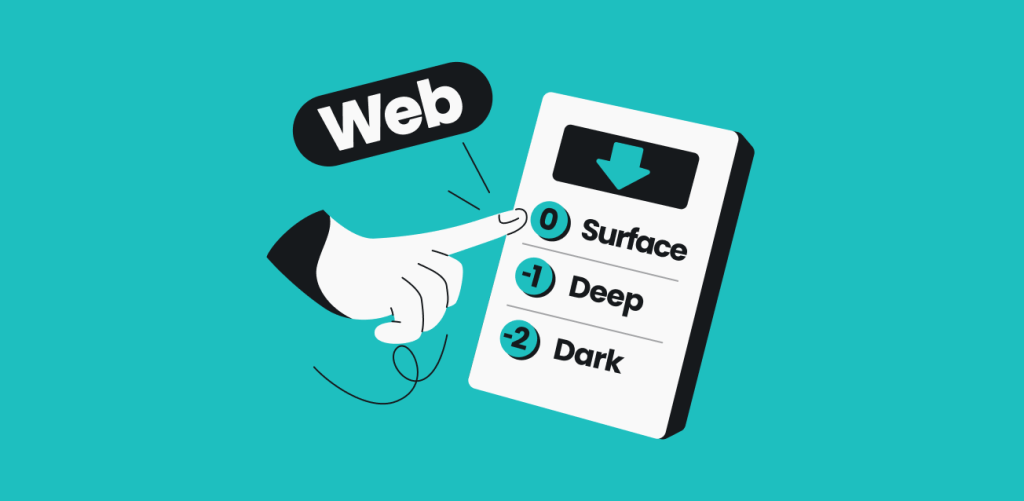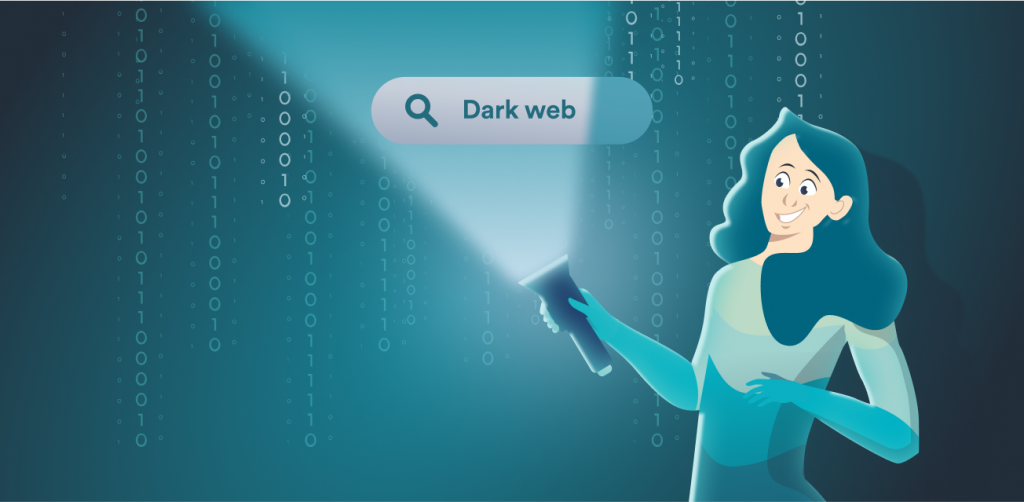
If you watched a single procedural TV series recently, they definitely featured at least a single internet-heavy episode. Aside from questionable keyboard use, they will have thrown around terms like “deep web” or “dark web.” Those are not some made-up hacker terms to confuse the audience — those are actually real things! And we’re here to tell you about the differences between the deep web and dark web.
Table of contents
Surface web vs. deep and dark web
The surface web is your usual, everyday internet use, pages that can be found via search engines and accessed without passwords or other special treatment:
- Google;
- The Surfshark blog;
- eBay listings;
- YouTube.
The deep web is all the websites — and parts of websites — not indexed by search engines (read: unsearchable by Google), which may require passwords to enter and are usually used for mundane utility tasks:
- Your GMail inbox;
- Your Surfshark account accessed via the Surfshark website;
- Your eBay account pages where you can try selling items despite the bonkers user interface;
- Your YouTube creator page, where you upload and manage videos of your cat.
The dark web is, according to Wikipedia, “the content of darknets” (yes, these terms are confusing), obscured networks that exist on top of the regular internet yet require specific software to access:
- Every website on the Tor network;
- Silk Road;
- Versions of regular websites hosted on Tor.
What is the deep web?
The deep web refers to the unseen utility spaces of the internet. Any website that search engine crawlers can index belongs to the “surface web” — the public internet for you to find and use. Deep web lurks just below, in the form of your user accounts, administrator access to website back ends, and more.
If you can’t find it on Google (search engines never point directly to your email inbox) but can access it by knowing a link and a password, it’s on the deep web. The deep web sites can be:
- Private social media profiles;
- The inside of your bank account;
- Email inboxes;
- Confidential corporate web pages;
- Internal company and school systems;
- Paywalled content;
- And so on and so forth.
What is the dark web?
Technically speaking, the dark web is the content existing on darknets, closed-off networks that exist on top of the regular internet and use its infrastructure. The two terms are used interchangeably, just like the World Wide Web and internet are. However, unlike the clear net, the dark web stays hidden from normal browsers. While it certainly hosts criminal marketplaces, it is also a refuge for privacy-minded users and people bypassing censorship in restrictive countries.
An example that you have likely heard of is the Tor Network (The Onion Router). Others, like the Invisible Internet Project (I2P), exist, but Tor is the most famous darknet in the world. It hosts .onion websites that require having the Tor Browser to access. That’s right, not only is the dark web not accessible via search engines, it’s not even enough to have a link and password — you need a special browser to access it.
All this secrecy is important because the dark web contains:
- Crime. Dark web marketplaces — like Silk Road — for guns, drugs, and whatever other stuff a bored cop doing an entrapment is willing to come up with are probably the most well-known feature of this network;
- Copyrighted books. Tor and such don’t have the speed to run pirated game and movie sharing, but it’s still enough for sharing scanned books outside of the reach of DMCA-armed publishers;
- Drop sites for whistleblowers. Whistleblowing is dangerous even when there’s no law against it, and dropping some incriminating evidence of corporate wrongdoings is something best done as securely as possible;
- Dark web versions of mainstream news sites. This is one way to get the news very securely. Very important in oppressive states since they’d have a hard time blocking access to it (though ISPs — Internet Service Providers — can detect Tor usage);
- Dark web forums. Of course, the nature of the medium means that subjects might quickly turn criminal. While some spaces act close to your regular forums, you don’t go through all the trouble of accessing the dark web to complain about the newest Pokemon release;
- Weird blogs. Maybe you’re just someone who has a dark web blog for novelty reasons, or maybe there’s a deeper reason for it. For example, tech enthusiasts made blogs dedicated to questionably-legal things like exploring university maintenance tunnels, an idea so cool it made it onto our list of 10 Tor websites to experience;
- Dark web search engines. They exist, but due to the nature of the places (websites go down constantly), they are not even close to approaching the usability of, say, Bing.
What is the difference between the deep web and the dark web?
The dark web is a deliberately hidden subset of the deep web: all dark-web sites sit inside the deep web, but most deep-web pages never touch the dark web.
Deep web vs. dark web is an apples-and-oranges comparison, but since barely anyone understands that, we will try to get into it.
Scope
The deep web encompasses everything you need a login to access. We have 5 billion internet users, and each is likely to have more than one account: an email, a social media account, some e-shopping account… All of that password-protected content is on the deep web.
On the other hand, the dark web is a dark reflection of the regular World Wide Web. It has websites and even a few search engines. It has its own deep web, as dark web websites come with user accounts and other private areas.
Operations
The deep web is a normal part of the everyday World Wide Web operations. As far as the technology is concerned, there’s very little between transmitting the public homepage of Facebook (pestering you to log in) and the interior of your account (pestering you to buy scam products).
The dark web requires a little more technical skill from you. The darknets it operates on aren’t usually accessible via regular browsers – as we said, the Tor Network requires the Tor Browser.
Size
Fun fact: the internet is considered to be 90-95% deep web.
Think about how many people will see the Gmail login screen on the clear net and how many individual Gmail accounts there are on the deep web. Now apply that logic to everything else, and you can start to grasp the difference in scale.
Due to the fluid and unofficial nature of the dark web, nobody knows how big it is. However, since it’s usually not that easy to access or not that comfortable to use (Tor was made with secrecy, not streaming, in mind) and is of interest mostly to the criminal element and some activists, it has to be a lot smaller.
Applications
What are the applications of the deep web? Anything that requires privacy and security:
- Guarding the user’s privacy and data: webmail, online banking, cloud storage, restricted-access social-media pages and profiles, some web forums;
- Paywalled services: video-on-demand, online magazines, and newspapers.
The dark web goes even deeper since you’re likely to need to know the address of the dark web website in the first place to access even the public content, let alone access the services:
- Hacker forums;
- Drug marketplaces;
- News organization drop boxes for whistleblowers;
- Emails for activists.
Security
The deep web is fairly secure: it’s the regulated part of the internet, working on all sorts of agree-upon protocols and such. The weak link here is usually the user who can inadvertently reveal sensitive data due to lapses in security. This may happen due to phishing, malware, or hacking.
Because the dark web operates outside the oversight of central authorities and requires specialized software to reach, any site you open there may hide malware, phishing traps, or outright scams.
Risks of accessing the deep and dark web
The risks of accessing the deep web vs. the dark web may be similar but not exactly the same.
Risks of accessing the deep web
The risk of accessing the deep web is simple: someone may steal your login data. This may be because you’re using unsafe public Wi-Fi, your device has been hacked or infected with malware, and so on.
Risks of accessing the dark web
The danger of accessing the dark web also involves login data theft, but also other issues as well. They arise as the logical conclusion of a totally wild web space. Every downloadable file is potentially infected, any purchase is likely a scam, and any login link may be a phishing attempt. And that’s aside from the fact that you may see or read something you wish you hadn’t.
Is accessing the deep or dark web illegal?
In the broadest sense, it’s not illegal to access either of the webs. In more detail…
Is it illegal to access the deep web?
It is not illegal to access the deep web. Otherwise, I’d be in trouble since the Google Docs page on which I’m writing this article is part of the deep web. If it was illegal to access the deep web, it would be illegal to see or do anything online that requires you to sign into your account.
Is it illegal to access the dark web?
It’s not illegal to access the dark web. However, some countries are trying to crack down on Tor use.
Whether on the deep web or the dark web, doing illegal things is still illegal.
How to access the deep web safely?
If you have ever heard any instructions on how to safely use the internet, you already know how to safely access the deep web. But as a refresher:
- Always use HTTPS: this provides basic data security;
- Never click suspicious links: phishing and malware spread through links in email, social media, and so on;
- Don’t download suspicious email attachments: actually, follow our protection from phishing guidelines;
- Use a VPN (Virtual Private Network) when connecting to public Wi-Fi: public Wi-Fi may be compromised, but using a VPN turns those attempts at data theft into nothing;
- Always update your firewalls and antivirus software: they are the first line against you getting compromised;
- Don’t log in on public computers: the devices may be compromised on purpose, and you may also forget to log out/delete the login details/etc.
How to access the dark web safely?
To reach the dark web securely, you first need a specialized browser (most people use Tor) paired with a VPN to cloak your real IP address.
- Make sure all your software is updated: software updates also include security patches, even if we’re not talking about an antivirus app or a firewall;
- Use a VPN: an additional layer of protection before you engage Tor;
- Be careful what you click: both for your mental safety and the safety of your device;
- Don’t enter any personal or sensitive data: probably self-explanatory.
Conclusion — the deep web isn’t the dark web
When it comes to comparing the dark and deep web, the differences are many. But at this point, you have read the article and learned the basics. Perhaps that has awoken you to the need to maintain your privacy and security on all of those webs? In that case, you should consider getting a VPN.
FAQ
What is the difference between the deep web and the dark web?
The deep web is any online area not indexed by search engines. The dark web, on the other hand, typically requires special software or authorization and can carry higher security risks. Understanding each helps you stay safer online, especially when combined with security tools like a VPN.
What browsers can I use for the deep web and the dark web?
Deep web: Any regular browser (Chrome, Firefox, Edge, Safari, Brave) can open password-protected or paywalled pages. Just be sure it’s up to date and uses HTTPS.
Dark web: You need a special browser such as Tor Browser to reach .onion sites. Other standard browsers cannot connect to the dark web.
For the deep web, here’s a list of good privacy browsers.
For the dark web, it all depends on the circumstances — and you’re unlikely to have a choice at all. A notable example is Tor: you need the Tor browser to access it.
Is the deep web safer than the dark web?
Yes. The deep web is part of your everyday web and thus has to comply with all sorts of security standards and be hosted by companies that have at least some interest in maintaining their users’ privacy.
What is found on the dark web?
On the dark web, you can find:
- Dark web versions of major websites;
- Drop sites for whistleblowers;
- Markets for illegal goods and services;
- Sites for software, etc., piracy;
- Essentially a less legal, less polished alternative to anything on the clearnet.
How do you access the dark web?
The easiest way to access the dark web is to download a Tor browser and then access the Tor Network.
Can the police track you on the dark web?
Police tracking you on the dark web depends on two things: them finding a way around the security the darknet has put in place or you supplying identifiable information online. A more likely case is a user falling for a honeypot scheme.
What is the best dark web VPN?
Surfshark is a great VPN for the dark web, as we have a lot of servers around the world, and our track record of not tracking users is spotless.
Which is larger—the deep web or the dark web?
The deep web is much larger. It holds most password-protected content (email inboxes, cloud files, banking pages, etc.). The dark web is a tiny slice of the deep web that sits on special networks like Tor.
Is there something deeper than the dark web?
Yes, the deep web of the dark web. Some people claim that a shadow web exists even deeper, but it’s most likely an urban legend.
What is the shadow web?
Shadow web is nearly guaranteed to be an urban legend about a net deeper than the darknet that contains even more illegal stuff.

